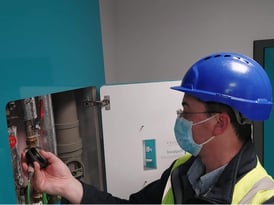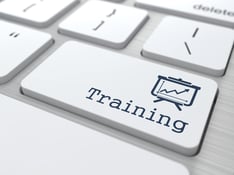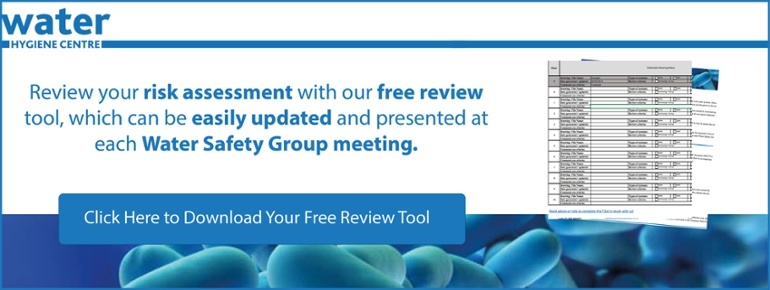In part 1 of this blog, we outline the basics of Legionella management for any organisation and Governance, Legionella Risk Assessments, Legionella Training & Competence.
It is very important to ensure you understand exactly what needs to be done on your site(s) to ensure compliance with guidance, as a minimum; if there are any areas of ambiguity these should be resolved as soon as possible.
Legionnaires’ Disease is considered a preventable disease because we inadvertently design and build systems that may facilitate the growth of Legionella bacteria to a level that represents a risk to public health. It is therefore the Landlord/Duty holder’s responsibility to ensure that the property/properties under their control are suitably managed to mitigate Legionella risk – as far as reasonably practicable.
If you are using a water hygiene company, then ask yourself are they a member of the Legionella Control Association? Membership requires an organisation to provide a commitment to ensure that all clients are aware of their obligations under ACoP L8, HSG274 and any other applicable guidance, such as (S)HTM 04-01 or (S)HTM 01-05 safe water in healthcare premises, which provides the basis for all controls you may require.
Why have a Legionella Risk Assessment?
 A Legionella risk assessment for your property should be carried out to identify the assets on site and the required pre-planned maintenance. Once the schedule of pre-planned maintenance tasks begins, the findings should be reviewed, and actions taken if the results fall outside the recommended ranges.
A Legionella risk assessment for your property should be carried out to identify the assets on site and the required pre-planned maintenance. Once the schedule of pre-planned maintenance tasks begins, the findings should be reviewed, and actions taken if the results fall outside the recommended ranges.
From this, you have a responsibility to produce a clear and concise written scheme of control (part of your Water Safety Plan). If you employ Water Treatment/Water Hygiene companies as service providers to help you deliver part of the work, they too should be named in this document.
It is important to note that the two-year frequency for carrying out a new risk assessment was removed from ACoP L8 in 2013 however this doesn’t mean that the assessment is a finished document as regular risk assessment reviews should be undertaken by competent personnel routinely to ensure continued compliance and if established these should be discussed by your Water Safety Group.
Who should attend Legionella Training?
Duty holders have the responsibility to keep a safe estate to adequately protect occupants from waterborne pathogens such as Legionella and opportunistic pathogens. Failure to do so is likely to result in prosecution depending upon the extent of non-compliances/water management failings that have been identified.
 Regular training of staff, both internal and external is an important aspect of maintaining control and should be routinely reviewed and be appropriate for the role they are undertaking. There are many Legionella training courses available, specific to each role within water safety, from basic Legionella awareness of the risks for all staff to Competent Person(s) (maintenance personnel), Authorised Person(s) (maintenance managers/supervisors), and finally to Responsible Person(s) (senior manager).
Regular training of staff, both internal and external is an important aspect of maintaining control and should be routinely reviewed and be appropriate for the role they are undertaking. There are many Legionella training courses available, specific to each role within water safety, from basic Legionella awareness of the risks for all staff to Competent Person(s) (maintenance personnel), Authorised Person(s) (maintenance managers/supervisors), and finally to Responsible Person(s) (senior manager).
Assessing Competency
One of the key responsibilities of a Duty holder is to fully understand how to ensure that estate operational/technical plans are suitable and sufficient and fit for purpose. These are required to address Legionella risk associated with the property/estate they are responsible for.
If however, the Duty holder does not have the required competencies to enable them to design, implement and update these technical plans, referred to as written scheme, then this authority/responsibility may be devolved to a nominated competent person within the organisation – this person must be formally appointed in writing by the Duty holder as is often referred to as the Responsible Person for Water (RP[W]).
 Defining ‘competence’ is therefore critical and of significant importance to maintain control and ensure that the person has the skills, knowledge, attitude, training and experience to deliver the role competently.
Defining ‘competence’ is therefore critical and of significant importance to maintain control and ensure that the person has the skills, knowledge, attitude, training and experience to deliver the role competently.
The HSE describe competence as “the combination of training, skills, experience and knowledge that a person has and their ability to perform a task safely”, so competence in health and safety should be seen as an important part of ‘workplace activities’ rather than an add-on or afterthought. (“What is Competence? - Competence in health and safety - HSE”)
Therefore, when identifying a ‘competent person’ i.e. the Responsible Person (Water), for water management, that person should take a holistic approach to all associated health and safety. This requires continuous improvement, which includes undertaking and completing relevant competency-based water hygiene Legionella training and appraisals. This approach will help to ensure the smooth operation of the property/properties under their control.
Failure to formally appoint an appropriately trained individual(s) is likely to be non-compliant which will present a potential risk of harm to service users, contractors and the general public/users of the property/properties under their control. This could lead to legal action being taken against an organisation.
Further reading> Legionella Management onsite: Back to Basics - Part 2
Feel free to reach out if you have any questions about the issues mentioned above or if you would like to consult with one of our experts on water hygiene.
Editor’s Note: The information provided in this blog is correct at the date of original publication – March 2023.
© Water Hygiene Centre 2023









